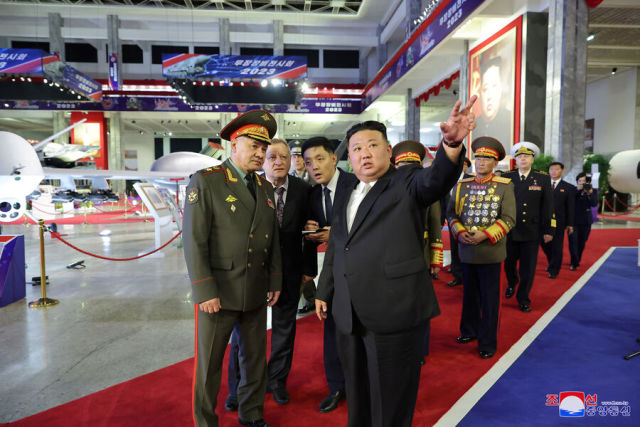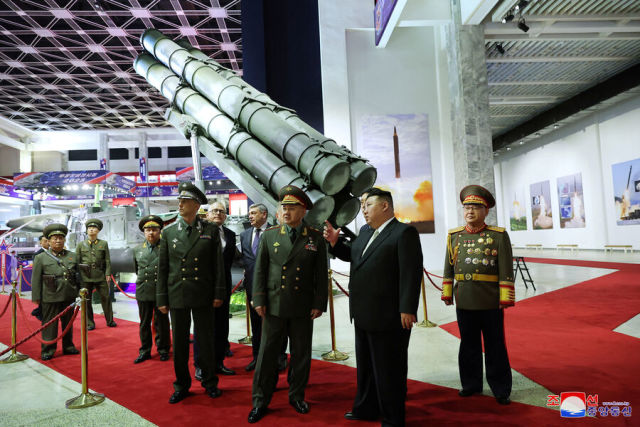Colonel Khodarenok said that the DPRK could transfer shells and ammunition to Russia
On the evening of July 25, Russian Defense Minister Sergei Shoigu flew to the DPRK. Foreign analysts believe that the main purpose of the visit is negotiations on the supply of North Korean weapons and military equipment to Russia. Military observer of the Newspaper.En" Mikhail Khodarenok analyzed what kind of weapons Pyongyang can transfer to Moscow.
The announced purpose of the visit was the participation of the Russian Defense Minister in events in honor of the anniversary of the end of the Korean War of 1950-1953, as well as negotiations with representatives of the North Korean military and political leadership.
On July 26, Shoigu met with North Korean Defense Minister Kang Sun Nam. Then the Russian minister was received by the leader of the republic Kim Jong-un. According to the Russian Defense Ministry, during the conversation they exchanged views on global and regional security issues. After the talks, Kim Jong-un and Shoigu toured the exhibition of weapons and military equipment in Pyongyang. There were presented, among other things, intercontinental ballistic missiles, armored combat vehicles, unmanned aerial vehicles.
Of course, the details and details of the negotiations will not be known soon (if at all). Therefore, judgments about the achieved results of the visit to the DPRK can currently be based only on assumptions, versions and hypotheses. In other words, purely personal opinions.
According to Bloomberg, Russia may be interested in buying 152-mm artillery shells from the DPRK, which are compatible with Soviet-era weapons. The agency's publication appeared against the background of a three-day visit to Pyongyang by a Russian delegation led by Shoigu.

However, there is every reason to assume that this issue is much broader. And in the Armed Forces of the DPRK there are much more different types of weapons and military equipment, which are similar to the Soviet / Russian ones. And the phrase of the Bloomberg agency "152-mm artillery shells" sounds from the point of view of a specialist, I must say bluntly, not quite correct.
How could the Russian application for receiving weapons, military and special equipment from the DPRK, primarily ammunition, look like?
Russia is primarily interested in receiving the following ammunition from the DPRK:
▪️100-mm high-explosive shell rounds;
▪️122-mm high-explosive shell rounds;
▪️152-mm shots - from high-explosive fragmentation shells to cluster shells with cumulative fragmentation warheads;
▪️122 mm unguided projectiles for BM-21 Grad multiple launch rocket systems;
▪️82 mm mortar rounds with a fragmentation mine;
▪️120 mm mortar rounds with high-explosive fragmentation mine;
▪️Hand grenades - defensive and offensive;
▪️anti-tank and anti-personnel mines of various modifications;
▪️7.62mm rifle cartridges (of various modifications - from cartridges with a bullet with a steel core to sniper cartridges);
▪️5.45mm cartridges (from cartridges with an ordinary bullet to cartridges with a bullet of increased penetration);
▪️12.7mm cartridges - from cartridges with a bullet of increased penetration to cartridges with an incendiary bullet of instant action;
▪️14.5mm cartridges of various modifications;
▪️23-mm cartridges for anti-aircraft installations of the Ground Forces;
▪️various equipment for the military medical service and rear services, primarily equipment (steel helmets, bulletproof vests, etc.).
Both Moscow and Pyongyang are interested at this stage in expanding and deepening military-technical cooperation, and for both sides it will certainly be very, very mutually beneficial. It is quite possible that part of the payments for the purchase of weapons and military equipment will be carried out not in freely convertible currency, but on the basis of barter transactions. For example, Pyongyang transfers ammunition to Moscow, and Moscow supplies North Korea with samples of weapons and military equipment. And organizes the transfer of technologies in which North Korea is interested.
Recently, opinions have been voiced that such negotiations and possible supplies of weapons and military equipment from the DPRK are fraught with at least reputational losses for Russia. It is impossible to agree with this. During the state's armed struggle, when the price of almost any issue is exceptionally high, all means are good. And while the Russian military-industrial complex is spinning up to full speed, supplies of ammunition from the DPRK will come in handy.
Mikhail Khodarenok





